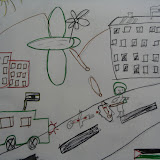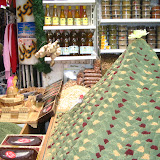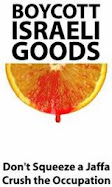Still in Tel Rumeida. The weather is terrible, but it's supposed to be better tomorrow. And on a positive note, it keeps the settlers inside so they are slightly less violent towards the Palestinians, which is good.
Watching peoples' lives here, I've been thinking a lot about hope- how important it is, and how people here always seem to have some left over, no matter what happens. I think maybe it is because here there is no time to lose hope. You can't. It's not just like you can't because then life would be too miserable- it's that here, hope, and living, and resistance are all intertwined and to give up one you must also give up the others. And you can't give up living, so you can't give up the others.
At the same time, I am starting to understand the desperation of people here on a different level. And how desperation and hope are not opposites, but really, to have desperation, you need to have hope, because you are desperate, hoping, for things to be different. I mean daily life for Palestinians includes checkpoints, getting asked where they're going when they're just leaving their house to go to the market, being held while an occupying force checks their ids, in the rain...the way it's standard to handcuff and blindfold people who are being detained, not even arrested, just detained...the soldiers and tanks in the streets. Doing interviews, everyone knows someone who has experienced violence from the settlers and the soldiers, if they haven't experienced any themselves, which they probably have. And then, on top of all this, they invade Ramallah. I know I already wrote about this, but this is a reflection rather than a report. On top of all this daily harassment, there is an invasion. They bulldozed cars and shops in the central square for no reason at all. And killed 4 people. And injured more. On top of it all. And then when life goes back to normal, it is not really normal at all.
The other day on Shuhada Street, the street which Palestinians walked on about a week ago for the first time in years, we tried to go through on our way back from a tour of the old city with someone's mom. Our Palestinian friend asked the soldiers if we could pass through Shuhada Street, which was the direct route from where we were to our flat.
Soldier "Where are you from?"
Friend "I'm from here"
"So you're Palestinian?"
"Yes, I'm Palestinian. But they are from U.S., Austria, South Africa, Spain..."
"South Africa? I'm from South Africa."
"She is from South Africa."
"I don't know her."
"So can we pass?"
"You are Palestinian?"
"Yes, I'm from here."
"Palestinians cannot pass on Shuhada Street."
"Can they pass?"
"Yes, they all can pass."
Of course we all turned around and went back, the long way, the way we came. Everyone can walk on this road except Palestinians. And it is their road.
I should send out more updates so they are shorter.
A couple of Israeli activists stayed here right now. Israeli anarchists to be more specific. One of them was what people refer to as a "lifesteyle anarchist." She was talking about activism, and how she thought people shouldn't be expected to be involved in active resistance, and that living "without hurting anyone," (i.e. being vegan, farming organically, etc) is enough. I've heard this argument before in the U.S., and it frustrates me, but this was different. She started talking about her family. Saying, "we are farmers, my parents just take care of their land, they are good people" talking about her friends who "live outside society" and farm "their" land on a kibbutz. At the end she says "I don't think it's fair to expect people to all be activists, these people aren't hurting anybody, they're just taking care of their land---" I interrupt "But it's not their land!" Tension rises. "Where are they supposed to go?" "I don't know where they should go. But no it is not enough for them to farm this land. Farming stolen land is not a form of resistance." But, the U.S. is also stolen land. So I think this logic can be extended.
I've been thinking a lot about that. Comparisons with the U.S. Here, colonization is just at a different point. It is towards the beginning and it is more directly militarized. But it is the same process. And it has the same goals.
Alright, that is all for now. Back to smoking narguila (hookah)....citrus flavor, mmm....







.jpg)
